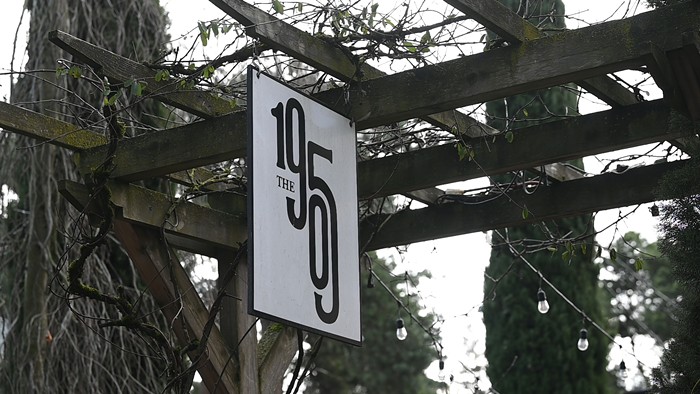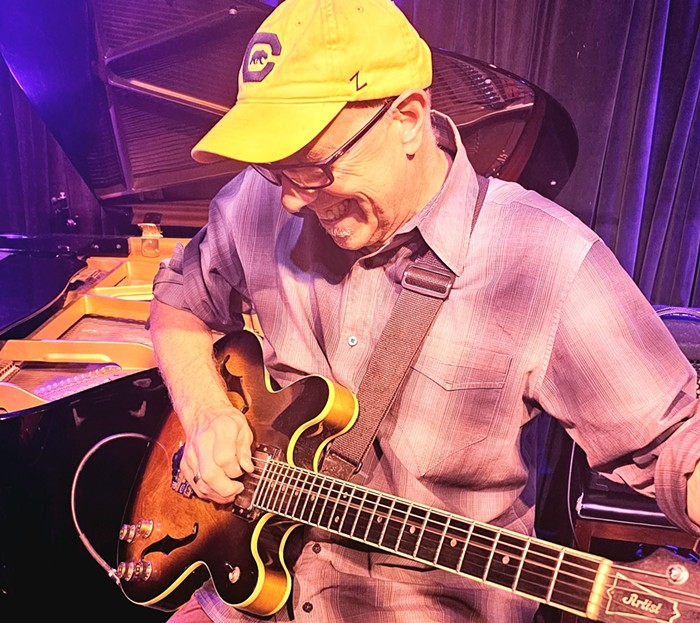IT WAS NEARING CHRISTMAS and she'd had enough: R. Stevie Moore had to go. The wife, who supported the prolific bedroom-recording pioneer through some 24 years had filed for divorce. He had no choice but to leave New Jersey.
"We just drifted apart," Moore explains. "I never thought it would really come to it, but I was handed an eviction notice. Broke my heart and kicked me in the balls, but I should've saw it coming."
Likely, Moore was instead buried in his own world. And under a certain light, it's easy to see how his mountains of work could be taken for those of a crackpot, hoarder, or some other self-appointed, under-appreciated genius. In the shadows of his 10,000-odd LP collection, Moore recorded some 400 albums of his own. It was all consuming. During more prolific periods, Moore says he finished one or more albums a week. Through a self-run mail-order catalog—the R. Stevie Moore Cassette Club—he released it all. Attempts to play live, however, mostly fizzled.
"I was not much of a performer," Moore admits. "I had a little bit of a stage fright." Moreover, he lacked discipline and desire to promote a touring band. The home-recording method, Moore explains, was "full of happy mistakes and accidents" and he didn't want to let it go.
"All of my records sound like mixtapes," Moore says of his tape-everything approach. "I never have tunnel vision with styles. I love hearing noise, followed by classical Mahler symphonies, followed by spoken word... you name it."
And while his thousands of songs dance and drift across—and outside—the spectrum, Moore admits a penchant for well-crafted pop. Even while working within the framework of Lennon and McCartney, Moore's compositions reflect the twisted, idiosyncratic, anxiety-ridden and darkly comedic voice of an entrenched outsider. His production processes warp these colors further. Using a variety of tape machines, then layering instruments one by one into full band arrangements, Moore helped create the warble, haze, glitter, and warmth that have become the very vocabulary of psychedelic bedroom recording today. These aesthetics, in part, were born of rebellion.
Born in 1952, the son of a well-established session player, Moore grew up in the country music studios of Nashville, Tennessee—Music City USA. Presented with following in his father's footsteps, Moore fled to New Jersey in '78 and spent the next 30-odd years tinkering with tunes that would've made Nashville's well-groomed, white-washed, and well-coifed industry plug their ears, break out laughing, or both.
Nashville was not a place Moore planned to return. But when the divorce came down he had no other choice. After the decades devoted to the creation of decidedly anti-consumerist art, Moore was broke. He had, however, a few devoted fans.
A fellow bedroom recorder and one-time member of the Tape Club, Ariel Pink had already been using his explosive stature in popular music to spread the word that Moore was a significant influence, an innovator deserving of attention. Then there was the documentarian who began filming Moore in New Jersey. Friends of the filmmaker suggested they could back Moore up; a Kickstarter campaign to fund a tour quickly surpassed its goal.
Suddenly, the newly divorced, almost-homeless, 59-year-old Moore was fronting a band of twentysomethings playing to young crowd. In the last few months they've performed across Europe and the States. "It's killing me at my age, to start doing this from the ground up," Moore says of touring while sounding nonetheless alive and inspired. "It's like being in the Army or something. I've never worked so hard in my life. And I hate to work."
But for a man who spent the last three decades finding it hard to make it out to the corner store, Moore couldn't be happier. After decades of neglecting live performance-—and some aspects of life in general—he has begun to revel in his reinvention.
"I count my blessings," Moore continues, "wishing I could do this for another 10 or 20 years. But I also wish it was 20 years ago—that I was just getting started."



















